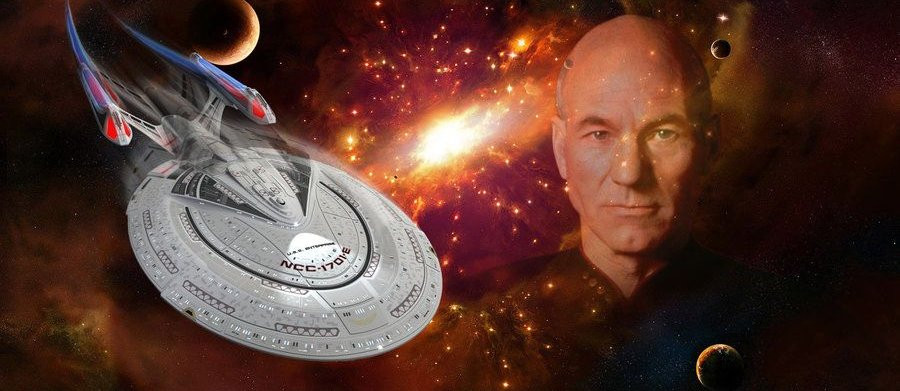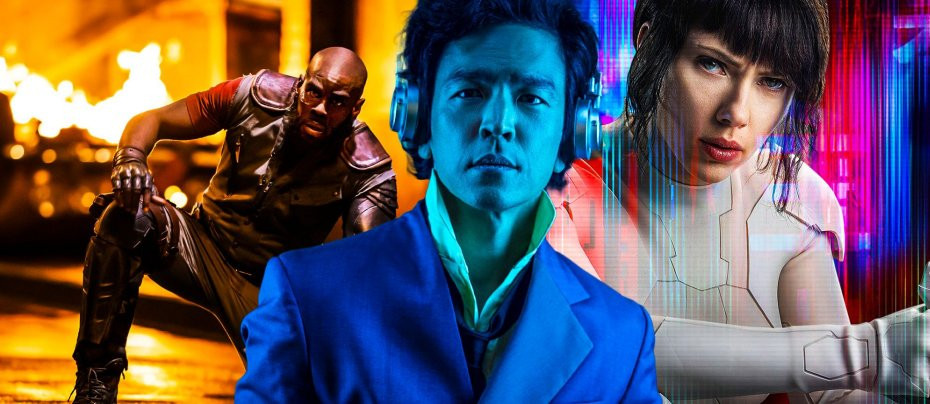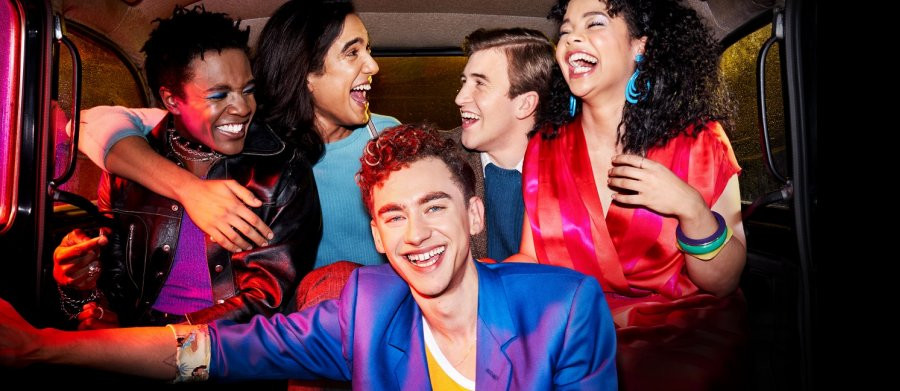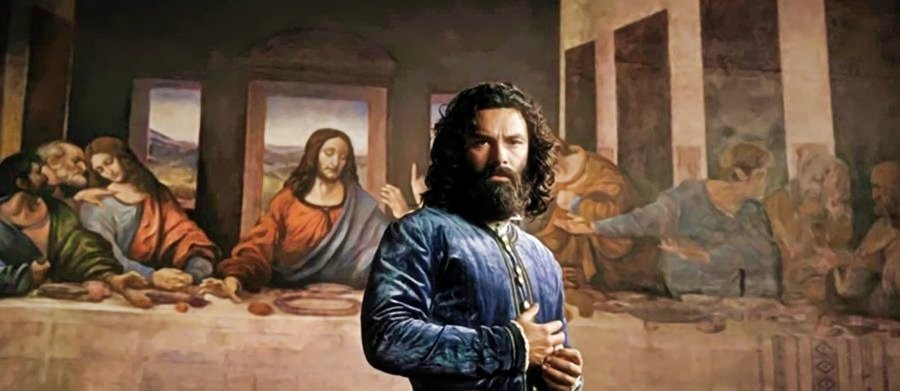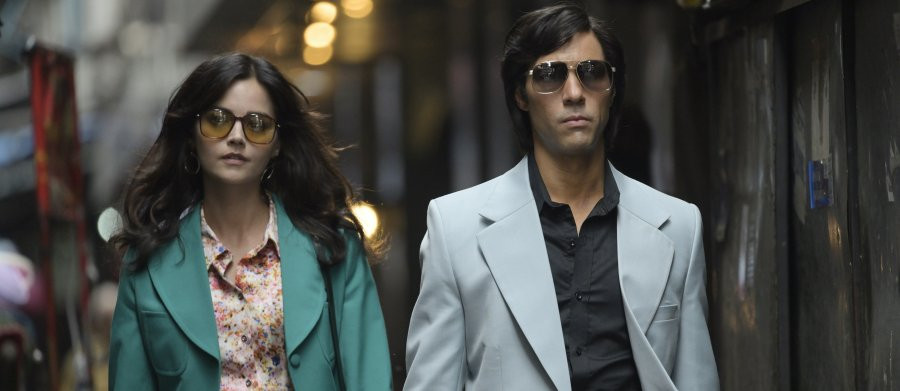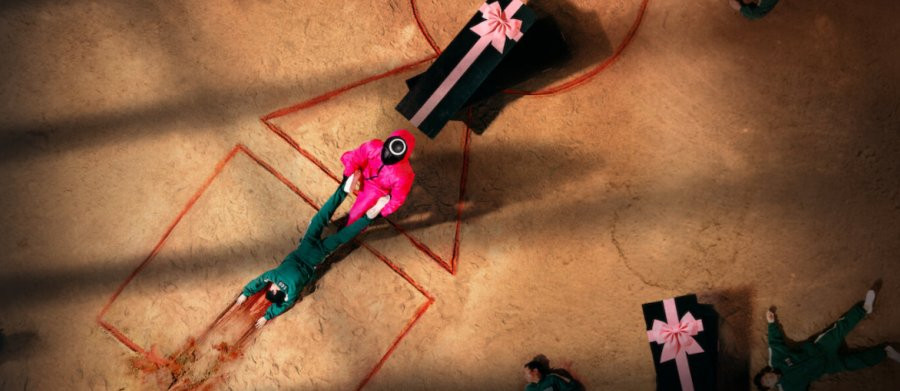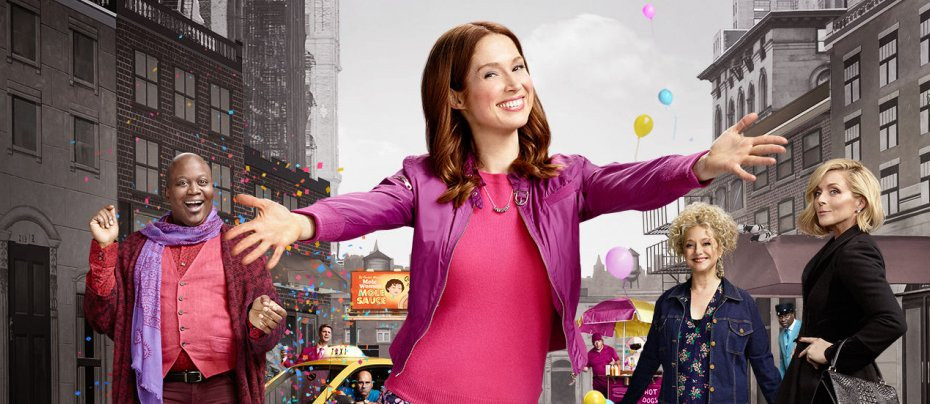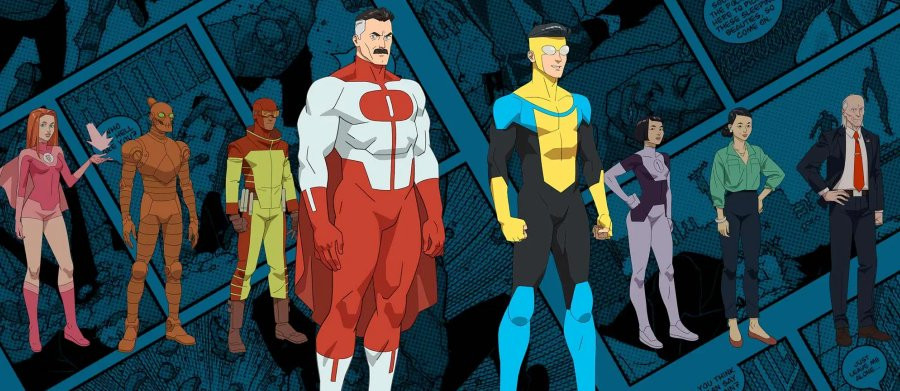
Invincible
2021 - United StatesSeasons 1 & 2 reviewed by John Winterson Richards
This is a spoiler light overview of the first two seasons of an acclaimed Amazon show which has a subversive take on what the world might be like if it was overrun with superheroes, which is based on an American comic book series, which has Seth Rogen and Evan Goldberg as Executive Producers, which invites us to sympathise with eager young protagonists but which is dominated by a morally ambiguous analogue of Superman, and which revels in hundreds of detailed genre references
...but which is not The Boys.
It seems that these shows work on the London bus principle: you wait ages for one and then two come along at once - from the same people.

The big difference between Invincible and The Boys is that The Boys is live action while Invincible is a flat animation in the Japanese anime style. Yet it is not a children's cartoon. There is a well established more adult end of the style - meaning it is aimed at male teenagers rather than actual adults - with lots and lots of gore. This is where Invincible ends up, even if it appears more innocuous at first. Indeed, the beginning seems positively childish. Much of the animation is of fairly low quality, especially in its clunky movement - a point satirised is a heavy handed meta scene in the second season - but from time to time a beautifully drawn panel or sequence shows us what the animators can do when they want, implying that the cheaper sequences are a deliberate homage to the traditional anime style.

Another important difference is that The Boys is more openly satirical. Although Invincible does have its tongue in cheek moments, especially in the final episode of the second season, it maximises their impact by generally avoiding obvious jokes and overt social comment. For the most part Invincible does not challenge attitudes currently fashionable in Hollywood. Everything is unquestioningly trendy. Looking at this in purely dramatic terms, there is sometimes a lack of authenticity about the characters and the relationships between them. Do people really talk and think and act as they do in Invincible? It might be thought absurd to ask the question in the superhero genre, but it is above all in a fantasy that special care must be taken to make the normal elements credible in order to maximise the impact of the fantastic elements.
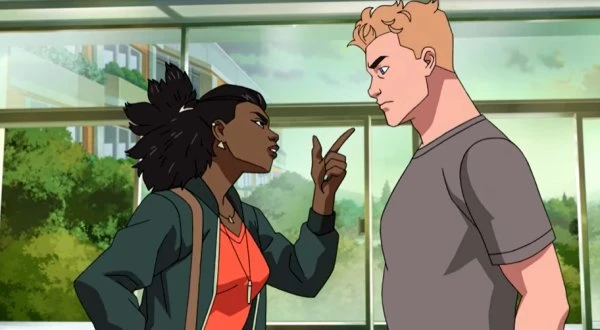
In particular, it is now practically compulsory to write all female characters as "strong." While a strong woman can add a lot to a story, to have nothing but alpha females is as artificial as making all male characters alphas. More importantly, it seems that a lot of writers - who are, as usual in the genre, mostly men on this show - equate "strong" with bossy when it comes to writing female characters. As a result nearly all the women come across as moody and unpleasant, and one is at a loss to explain why the male characters are attracted to them - except for the fact that they are, of course, physically appealing, which rather undermines the whole feminist agenda. It is as if the empowering message for young girls is now "Forget all that stuff about it being who you are inside that counts - you can act out how you want so long as you are good looking." A show that apparently wants to see itself as progressive therefore ends up with female characters as two dimensional as its style of animation. The writers seem to have become aware of this and made the women more human in the second season, even if it may be too little too late.
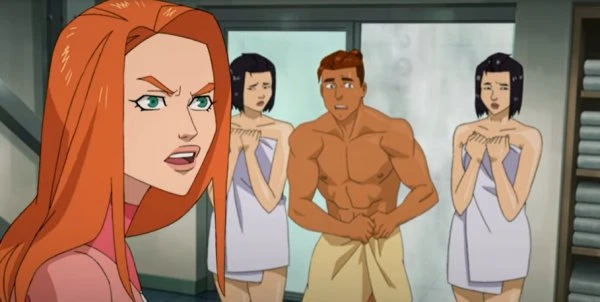
The sexual permissiveness agenda is also stretched beyond breaking point when a previously interesting character, who we are told is thirty years of age, takes the form of a young boy in order to be a suitable romantic interest for a 24-year old woman in the form of a young girl. We are supposed to be non-judgmental about this. No. No. No. And, also, yuk. Yet none of the other characters remark how creepy it is. Are we being asked if there is such a thing as being too tolerant or do the writers themselves really not see it?
So why is this often poorly animated cartoon with badly written female characters and odd attitudes so popular - and so enjoyable? For there is no denying that, in spite of its flaws, it has succeeded critically, commercially, and dramatically, transcending both its genre and its format. It is possible to put this down to three factors.
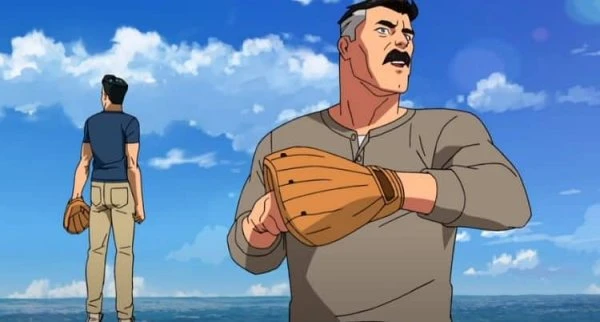
First and foremost, there is a great story here. It is in fact a very old story. It is not really a superhero story at all. It is a bildungsroman, the story of a young man coming of age. It just so happens that he has superpowers. He inherited these from his father, an apparently benevolent Superman figure from another planet who married a human woman and now lives with her in a comfortable middle class home, posing as a travel writer, in between doing great deeds. The plot therefore alternates between the standard heroic saga with the fate of the world at stake and a commonplace domestic drama about how a father's relationship with his son changes as the boy becomes a man. It is the latter that really gives the story its heart because it reflects the stresses that generally arise when the young lion reaches a point when he can challenge the old lion. It is simply that in this case the explosions are more literal.
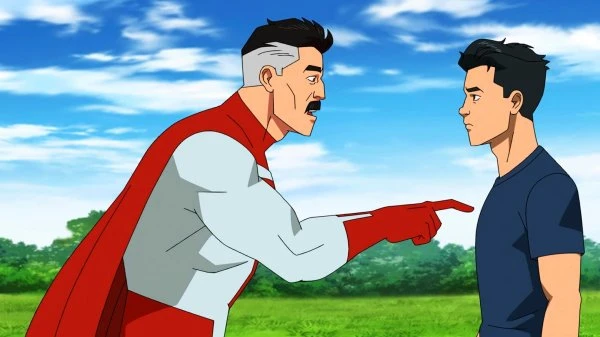
Second, the whole project is obviously the passion of people who are very genre literate. Our young hero is named Mark Grayson - one thinks immediately of Dick Grayson, Robin's real name in Batman. His father, Omni-Man, is Superman in every respect but one - the most important one. He works with, but is not a member of, a Justice League type group called the Guardians of the Globe, which has its own versions of Batman, Wonder Woman, and Aquaman, among others. The Guardians are in turn supported by a SHIELD-like quasi-Government organisation called the Global Defence Agency - and so on. There are so many other references to comic books, most too obscure for your reviewer, that genre fans could spend years discussing them.
It is a nice touch that the general population takes the existence of superheroes and supervillains for granted, and that attempts to kill or capture the President of the United States are viewed casually as a regular occurrence.

The third factor in the success of Invincible is its outstanding voice cast. On first seeing the art work for Omni-Man, your reviewer felt he simply had to be voiced by J K Simmons. The producers obviously thought the same, for J K Simmons it is. However, this is very much Whiplash J K Simmons, not Law & Order J K Simmons. There is no actor who is better at maintaining a character's ambiguity. Whenever we think we know where the character is going, he forces us to doubt. It is surely no spoiler to say that Omni-Man is not the perfect hero that his public image suggests, but even as he gets darker, we can never lose sight of the possibility that this is still a caring father trying to prepare his child for the brutal truths about the Universe with some very, very tough love.

This may be necessary because the child in question can come across as whiny and immature. Steven Yeun, best known from The Walking Dead, does well to keep him sympathetic. In much the same way, it takes the considerable talent of Sandra Oh to distract us from the fact that the character of Mark's mother, Omni-Man's wife of many years, makes little sense as written. We are asked to believe that a supposedly intelligent woman has not come to terms with some of the realities of her situation in all that time. One has to concede that, harsh it may seem, Omni-Man's point of view is at least understandable given the examples of humanity closest to him.
Walton Goggins may not be obvious casting as the Director of the Global Defence Agency, but he shows his mastery of his craft with a Nick Fury-esque authority figure totally unlike the more marginal characters he usually plays. Zachary Quinto brings a poignant humanity to a robot called Robot. Mark Hamill is Tailor to the Superheroes, a pleasing nod to The Incredibles, and Clancy Brown is a demon detective with more than a passing resemblance to Hellboy. Executive Producer Rogen turns up as an amiable character called Allen the Alien, his best role in years.
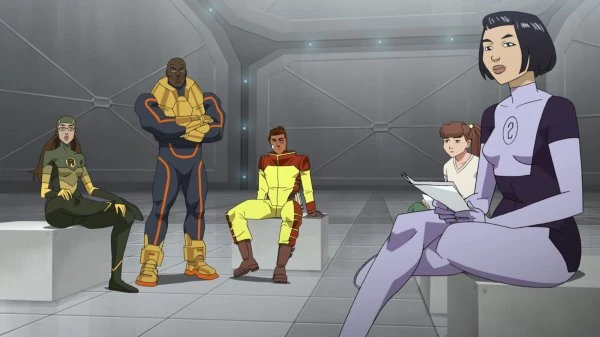
Other familiar voices include Kevin Michael Richardson, Djimon Hounsou, Zazie Beetz, Gillian Jacobs, Michael Dorn, Jon Hamm, Chad Coleman, Mahershala Ali, Fred Tatasciore, Djimon Hounsou, Tatiana Maslany, Calista Flockhart, and Jeffrey Donavan, some in two or more roles. Together, they bring an unusual depth to their cartoon characters. It is not only with Omni-Man that we are kept guessing which way a character, even a supporting character, is going to go. It is often unclear who is a hero or a villain. Supposedly good characters do apparently bad things - and vice versa. The moral is that no one is entirely good or entirely bad. This is as true of superheroes and supervillains as it is of everyone else.
Since story follows character, or should, we are also kept guessing about the plot. It does not take us in predictable directions. The good guys do not always win. They make mistakes. Innocents suffer because of them. A lot of time is spent building up a team of younger heroes, who are not particularly effective when put to the test - or at least not so far: one presumes that their development will be a more important theme in seasons to come.
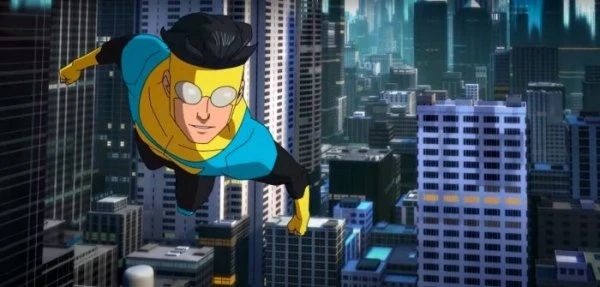
The good news is that there are seasons to come - at least one at the time of writing. Amazon took the unusual step of ordering not one but two more, soon after the successful release of the first. To fill the gap in the very long wait between Seasons One and Two Amazon also released Atom Eve, a clever one off stand alone special dedicated to the back story of Mark's potential love interest.
When it finally arrived, the second season suffered from the lack of the narrative spine which the main plotline of Mark's relationship with his father gave to the first, but it did open up some interesting possibilities. There is apparently a lot of raw material in the comic books. Yet the writers will do well not to allow themselves to become too distracted by it: Invincible is at its best when its focus remains on the messed up family drama at its core.
Seen this show? How do you rate it?
Seen this show? How do you rate it?
Published on April 9th, 2024. Written by John Winterson Richards for Television Heaven.


